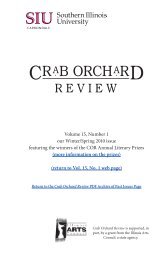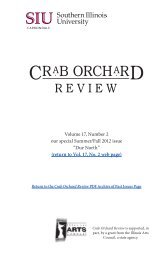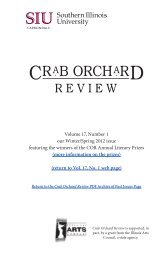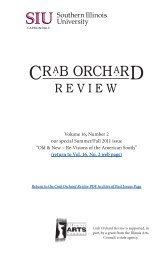Crab Orchard Review Vol. 12, No. 2, our
Crab Orchard Review Vol. 12, No. 2, our
Crab Orchard Review Vol. 12, No. 2, our
Create successful ePaper yourself
Turn your PDF publications into a flip-book with our unique Google optimized e-Paper software.
214 ◆ <strong>Crab</strong> <strong>Orchard</strong> <strong>Review</strong><br />
Nishta J. Mehra<br />
contrast to the solo we had been hearing. Aarti refers to two things—<br />
the devotional song itself, and the devotional act of lighting a lamp or<br />
lamps fueled with ghee, clarified butter. One by one, the women came<br />
forward to lift the sterling-silver lamp and circle it, clockwise, in the<br />
air as they sang. The words, though Sanskrit still, were familiar to me<br />
after years of repetition, though the meaning I only vaguely knew.<br />
Glory to You, O Divine Mother, glory to you who are so rich<br />
in maiden grace!<br />
You attend the gods and men, whose grief you drive away.<br />
You are mother of the universe, its sustainer, reliever of<br />
affliction, and bestower of happiness and prosperity.<br />
I was the only one still seated in the room during the song, and the<br />
women passing around the aarti lamp stood only about a foot away.<br />
Everything was so close; the bodies standing over me, the hot breath of<br />
the havan, the clashing pinks, yellows, and greens of the women’s saris,<br />
their husbands who stood next to them in blue jeans. The noise felt<br />
harsh, chaotic, grating, and I stood there waiting for the whole thing<br />
to be over. Then, very clearly, I heard my mother’s strong voice. She<br />
was standing right in front of me, the edge of her silk sari pulled up to<br />
cover her head in the traditional <strong>No</strong>rth Indian style. Her body was bent<br />
down in my direction, and her slender hands moved the lamp slowly,<br />
rhythmically, in keeping with the aarti’s pace. When I met her gaze,<br />
she gave me a look, one I could not recognize offhand. Her face was<br />
calm and insistent, mouth moving in accordance with the song. “You,”<br />
she seemed to be saying. “Pay attention, this is important.”<br />
The aarti was halfway through its second repetition by then—the<br />
song is always continued as long as is necessary for all the women to<br />
have a turn. I closed my eyes for a moment. I was hot and hungry and<br />
uncomfortable and bored, but my mother’s face warned me against<br />
thinking of those things. I opened my eyes instead and looked around<br />
me, into the faces that stood a few dozen inches away. Their eyes, those<br />
that were opened, and voices were directed at me. Every face was<br />
serious, genuine, focused…on me. But it wasn’t about me, I realize,<br />
looking back. There was no need for me, Nishta, to feel self-conscious,<br />
because it was not me, Nishta, whom they saw when they looked. I was<br />
just the vessel, a vehicle for her presence to come into that place. I was<br />
not an individual that day, but a representation of all that is female and<br />
powerful and worthy of worship.






